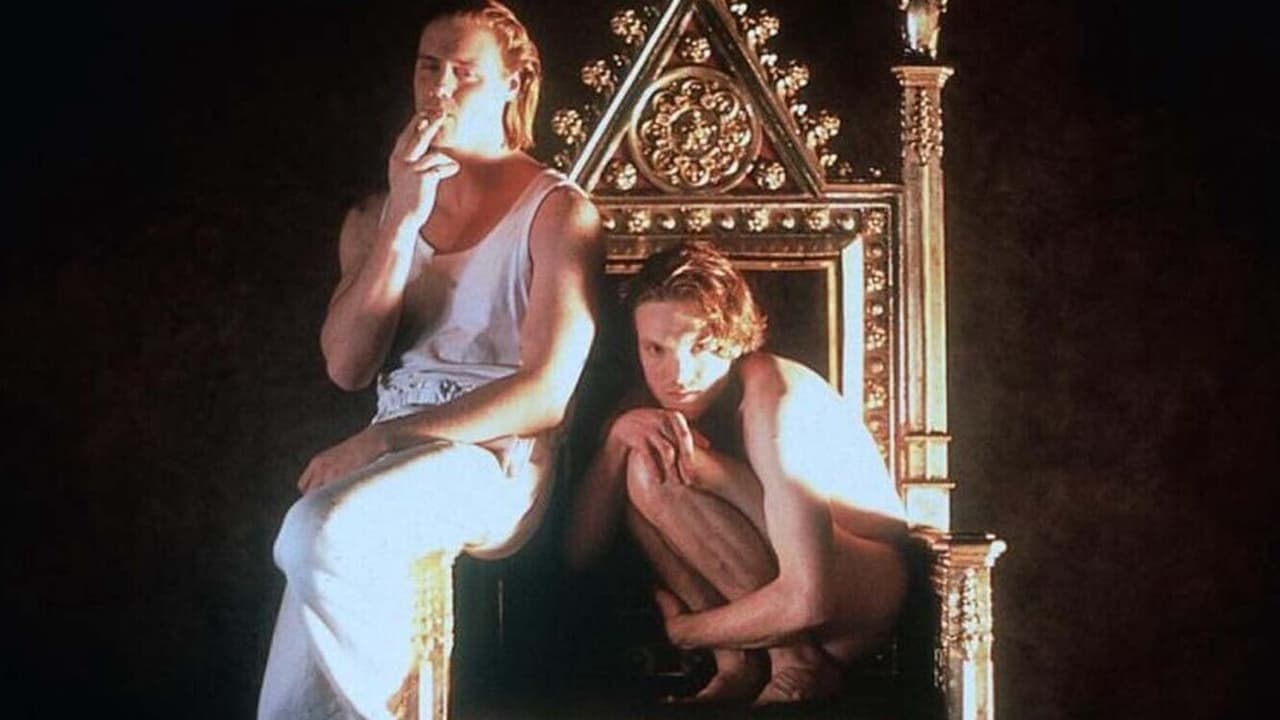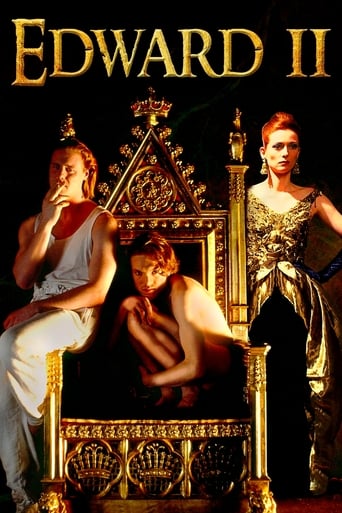Holstra
Boring, long, and too preachy.
ChicDragon
It's a mild crowd pleaser for people who are exhausted by blockbusters.
Doomtomylo
a film so unique, intoxicating and bizarre that it not only demands another viewing, but is also forgivable as a satirical comedy where the jokes eventually take the back seat.
Dr Jacques COULARDEAU
The film has both little to do with the play and yet is quite close to it. [...]Derek Jarman goes a lot farther since he erases the political dimension of the last scene in which Edward III has Mortimer executed in the most violent but "legal" way for the killing of his father and his mother imprisoned pending her trial as an accomplice to this murder. The young king in the film dances to some music from his MP3 reader on the cage containing Mortimer and his mother covered in waste. Edward III is wearing his mother's earrings, a fact that was also used in the previous scene when his own mother bit his uncle, Edward II's brother, at the jugular and drinks his blood like a vampire till death ensues. These earrings are the sign of the dependence of the child on the mother and become at the end, with the mother in the cage, a symbol of the continuation of the curse in this family that does not seem to clearly differentiate male from female and that is not only a question of sexual orientation. In a way that erases the feudal crime of Mortimer who seizes power or at least tries to by having himself appointed protector of the realm till the new king is of age to reign, though the protector should have been the uncle.[...]Jarman creates a very dark and menacing atmosphere by having many scenes in the underground foundations of some airless and lightless dungeons in a castle, and some of these scenes show the King imprisoned in such underground dump in which all wasted water, grey and black alike, are rejected in a pool that covers the whole ground and in which the king is supposed to live while he is prevented from sleeping by constant drumming day and night. These prison scenes interspersed in the whole film make the plot very awkward since there is no plot any more with these flash-forwards that tell the end before it ever could be envisaged. And this dark subterranean world is invaded and dominated by all kinds of military personnel in modern attire and equipment. We deal here with one characteristic of Derek Jarman's cinematographic art: the art of anachronistic references. From the very start we have cigarettes, then Big Ben's chimes, then those modern uniforms, then modern weapons, then the prince is playing with robots. There is no end to such anachronistic elements or props The intended meaning is that nothing has ever changed. [...]In fact the political dimension, including gay rights, is totally erased or veiled or hidden by the dark, tortuous, perverted world we are given to see: the people at all levels and all of them are perverted, including the King who forgets who he is and his responsibilities towards the peers, his family, his wife, his son, the church, etc. He is a perverse feudal ruler. Including Gaveston who forgets who and what he is. He is from France, from the lower levels of feudal society trying to dominate and get some revenge from the top layers of the English feudal society, and thus he becomes a perverted social climber. Spencer, in a way, is more respectable because he does not want anything from the King. He is at the King's service and provides the King with the care he needs. Including all the peers, church people and nobles alike, who are all perverted because they want to defend their privileges, their power, their social position without taking into account anyone else: they only speak of themselves and never of the people without whom they would be nothing. They are perverted feudal barons who have forgotten they are the protectors and the providers of their serfs and villains. Including of course the church who rants and raves about some kind of fictitious power of God or the church itself. Gaveston on that point is right when he rejects the See of Rome and calls it the See of Hell. [...]In other words Jarman is overdoing it.The transformation of the Prince from a discreet and invisible voyeur who can see things without being seen, into a mother's child, wearing her hat, her earrings and even her shoes on the cage at the end is pathetic and deeply unfaithful to Marlowe. This Edward III should be the restoration of order, law and order, authority, the expulsion of the perverted and rotten fruits or eggs from the basket. From the capricious authoritarian love affairs of Edward II we shift here to a childish whimsical tyrannical brothel of sorts in which the perverse sexual desires of Edward III will be totally assumed and satisfied. The realm is falling one full subterranean hell-scraper down with this Edward III. [...] As a song says in the film, Jarman has changed history and Marlowe's play "from major to minor" but here not "every time we say goodbye," rather from the very start and till the very end. The film is in minor tone and as such misses the multi-tonal music of today.Dr Jacques COULARDEAU
Claudio Carvalho
This gay adaptation of Christopher Marlowe play about the passion of the British King Edward II for a plebeian made by Derek Jarman, who died of AIDS in 1994, is very boring and confused. The film was shot on a stage, but the screenplay is very unpleasant and I could not wait for the end of the movie. I was attracted by the names of Tilda Swinton, John Lynch and Annie Lennox, and in the end, only the Lennox singing Cole Porter's "Every Time We Say Goodbye" was worthwhile. The DVD released in Brazil is unbelievably dubbed in Spanish, i.e., a British movie dubbed in Spanish to make it worse. In my opinion, "Edward II" might be mainly recommended for gay and very specific audiences. I had the displeasure of watching this flick on DVD on 27 August 2005. My vote is three.Title (Brazil): "Eduardo II" ("Edward II")
David
*Possible spoilers*Before his AIDS-related death in 1994, English filmmaker Derek Jarman (also an acclaimed painter and writer whose introduction to film was working as a set designer for Ken Russell) created a large and aggressively experimental body of work, developing a vivid personal style notable for its' political ferocity and its' unbelievable visual lushness. By the time EDWARD II appeared, Jarman had honed his innovative mix of surrealism, mind-bending shifts in perspective, and a well-articulated take on the political implications of gay liberation into a vision that at once placed him in the vanguard of late 20th century independent filmmakers, while simultaneously establishing him as one of the most uncompromising activist/artists to have never been described or marketed as such.EDWARD II – very loosely adapted from a 500-year-old Christopher Marlowe play about the doomed, deposed (and gay) English king – is all of the above combining in one brilliant flash, and Jarman was aware of the irony built into the fact that this very challenging, explosive tour-de-force of a film - shot on a shoestring budget - brought him closer to 'mainstream' success than anyone (including Jarman) would've ever believed possible. Maintaining much of Marlowe's original play – and the Old English dialog – while visually placing the story in the present day (the sets are minimalistic, with contemporary clothing and set design), Jarman attempts to locate – with surgical precision - the origins of violent, contemporary homophobia, and contemporary class bigotry as well (Edward's lover was a peasant, so the implications of social-class transgression are also integral to the story) in historic precedents.Jarman's art background contributes to the stunning visual effect, and he had worked with most of the cast before, lending the film an effective intimacy – things never seem too avant-garde, and the righteous sense of corrosive rage seen here (this is one of the angriest, most politically enraged films I've ever seen) – essential to this story – never veers off target.
naringc
I love Elizabethan drama. I had been on a Kenneth Branagh and William Shakespeare kick(and I guess I still am)when on a whim I bought this film based on the play of the same name by Shakespeare-contemporary Christopher Marlowe. I am very glad I did. Edward II(Steven Waddington of SLEEPY HOLLOW) ditches one icey, repressed Queen Isabella(Tilda Swinton) for another hot and uninhibited queen, gay lover Gaveston. But the romance is doomed when the nobility rises up with Isabella to end the affair. Director Derek Jarman's adaptation is one of those rare films that succeeds set in a time other than in its original setting. He moves the setting and action of the movie to the modern era, and this serves as a more timely backdrop for the movie's pro-gay stance, which seems to me to be its central theme. I really liked Steven Waddington, who was very, very good. And an unexpected surprise came from Tilda Swinton, an actress with whom I am not familiar but whose other work I'd like to see, based on the quality of her performance here. Strongly recommended!!!

